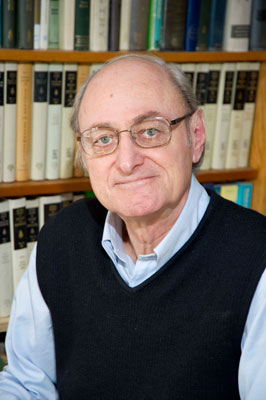Ivan Valiela Receives Odum Lifetime Achievement Award

Dr. Ivan Valiela of the MBL Ecosystems Center will receive the Coastal and Estuarine Research Federation's Odum Lifetime Achievement Award. The award recognizes Dr. Valiela's contributions to the understanding of coastal marine ecosystems, addressing critical management questions, serving the scientific community, and educating multiple generations of students.

This award is named for the three outstanding ecologists in the Odum family (Drs. Howard T., Eugene P. and William E. Odum, III), and it recognizes the lifetime achievements of a scientist whose sustained accomplishments have made critically important contributions to our understanding of estuaries and coastal ecosystems.
Dr. Valiela conducted groundbreaking saltmarsh studies in the Great Sippewissett Marsh and was the lead principal investigator for the Waquoit Bay Land Margin Ecosystem Research Project that assessed groundwater transport and nutrient loading to Waquoit Bay on Cape Cod. He was among the first to clearly demonstrate the coupling between watersheds and their receiving estuaries, and his 1992 paper on this topic in Estuaries remains the most highly cited paper ever published by the journal, with more than 440 citations. This work led to models of coastal nutrient loading that are widely used to assess the status of coastal ecosystems and to develop policies to reduce nutrient loading. This contribution is typical of Dr. Valiela’s scholarship. His work advanced basic scientific principles but typically has an applied angle that focuses on improving the quality of coastal environments.
"This award is richly deserved," said Ecosystems Center Director Christopher Neill, "Ivan has been an extraordinarily influential coastal ecologist both with his science an in the students he he's trained. I had the good fortune of attending Ivan's Marine Ecology class at MBL in 1983. It was my introduction to Woods Hole and it made a career in research both exciting and possible."
Locally, Dr. Valiela's work provides much of the scientific basis for understanding Cape Cod's nitrogen pollution problem, Dr. Neill said. "The models he developed also allow us to explore alternative futures and will help towns begin to solve this difficult problem."
In collaboration with John Teal of the Woods Hole Oceanographic Institution, Dr. Valiela began a salt marsh fertilization experiment at Great Sippewissett marsh in 1971, an experiment that continues to this day. The scores of manuscripts that have resulted from the Sippewissett Marsh research have defined much of what we know about saltmarsh biogeochemistry and community ecology. Dr. Valiela also co-taught the summer Marine Ecology course with Dr. Teal at MBL from 1975 to 1983. The decades of research that he conducted in Waquoit Bay system have contributed to the understanding of the causes and consequences of coastal eutrophication. Dr. Valiela also elucidated the critical role of macroalgal blooms in coastal eutrophication and eelgrass decline He has also worked in tropical ecosystems, and was among the first to estimate the global destruction of mangrove forests.
Dr. Valiela continues to pursue research in both temperate and tropical habitats. In one current project, he leads a team of scientists working in Panama to evaluate how varying amounts of watershed deforestation affect coastal mangrove wetlands and nearshore coastal waters.
He has written over 300 papers, a number of which are seminal papers in the fields of coastal marine ecology and biogeochemistry. He has also authored three books, Marine Ecological Processes, a widely-used textbook, Doing Science, a book geared to young scientists, and Global Coastal Change, an overview of overfishing, eutrophication, introduced species, and sea level rise in coastal regions.
Dr. Valiela taught in the Boston University Marine Program at MBL from 1969 until 2008 when he joined the Ecosystems Center. He has advised 12 master's and 43 doctoral students, many of whom have gone on to highly successful careers.
The Odum award will be presented at the meeting of the Coastal and Esutarine Research Federation's meeting in San Diego, California in November.